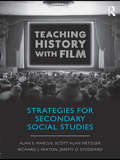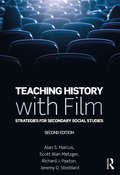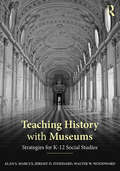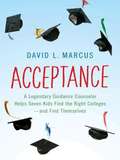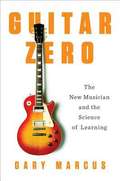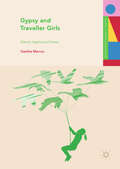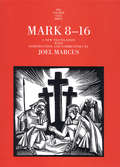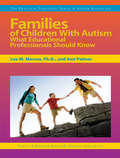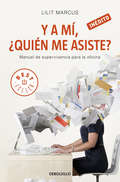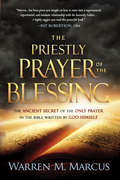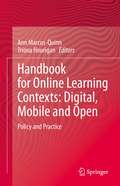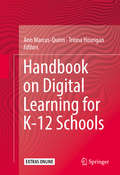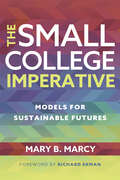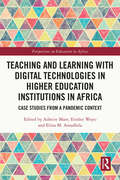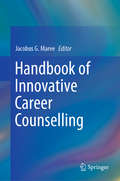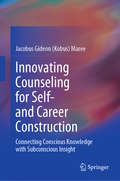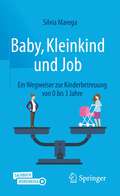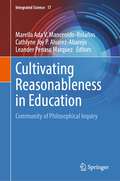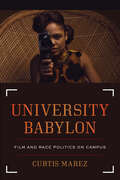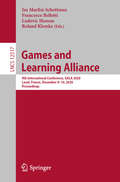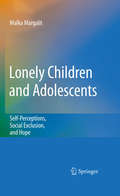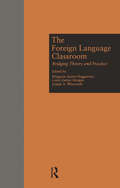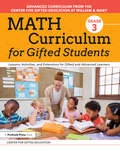- Table View
- List View
Teaching History with Film: Strategies for Secondary Social Studies
by Alan S. Marcus Scott Alan Metzger Richard J. Paxton Jeremy D. StoddardVisit any school in the United States and chances are that you will find at least one of the social studies teachers showing a film about history. Along with the textbook, movies are one of the most prominent teaching aids in the history classroom. Yet, when middle and high school history teachers look for models of the effective use of motion pictures in history classrooms, the cupboard is surprisingly bare. Teaching History with Film provides a fresh, engaging, and clear overview of teaching with film to effectively enhance social studies instruction. Using cases of experienced teachers to illustrate accomplished history teaching through the use of movies, this text provides pre- and in-service teachers with ideas for implementing film-based lessons in their own classrooms and offers a deeper understanding of the thorny issues involved in using film to teach history. Each section of the book focuses on how teachers can effectively support the development of students’ historical film literacy through topics such as using film to develop historical empathy, to develop interpretive skills, and to explore controversial issues. By developing the skills students need to think critically about the past or what they think they know about history, the lessons in this book illustrate how to harness the pedagogical power of film to provide the tools necessary for rigorous inquiry and democratic citizenship. Special features include: "Reflection on the Case," following each chapter, analyzing and discussing the strengths and limitations of the teacher’s approach as well as providing strategies for using and choosing films specific to the educational outcome Sample unit outlines, descriptions of class texts and films, worksheets, essay questions, viewer guides, and exercises for the classroom throughout Discussion of the practical considerations facing classroom teachers, including juggling time restraints, issues of parental permission, and meeting standards
Teaching History with Film: Strategies for Secondary Social Studies (Contemporary Research In Education Ser.)
by Alan S. Marcus Scott Alan Metzger Richard J. Paxton Jeremy D. StoddardTeaching History with Film provides a fresh, engaging, and clear overview of teaching with film to effectively enhance social studies instruction. Using cases of experienced teachers to illustrate accomplished history teaching through movies, this text provides pre- and in-service teachers with ideas for implementing film-based lessons in their own classrooms and offers a deeper understanding of the thorny issues involved in using film to teach history. The second edition is completely revised and updated including: two entirely new case studies; a new chapter focusing on using international film and incorporating a more global view in the classroom; and additional material on using film to tackle difficult and controversial issues; as well as updates to all of the cases. Each section of the book focuses on how teachers can effectively support the development of students’ historical film literacy through topics such as using film to develop interpretive skills, to explore controversial issues, and to develop historical empathy. By developing the skills students need to think critically about the past or what they think they know about history, the lessons in this book illustrate how to harness the pedagogical power of film to provide the tools necessary for rigorous inquiry and democratic citizenship. Special features include: "Reflection on the Case," following each chapter, analyzing and discussing the strengths and limitations of the teacher’s approach as well as providing strategies for using and choosing films specific to the educational outcome Sample unit outlines, descriptions of class texts and films, worksheets, essay questions, viewer guides, and exercises for the classroom throughout Discussion of the practical considerations facing classroom teachers, including juggling time restraints, issues of parental permission, and meeting standards
Teaching History with Museums: Strategies for K-12 Social Studies
by Alan S. Marcus Jeremy D. Stoddard Walter W. WoodwardTeaching History with Museums provides an introduction and overview of the rich pedagogical power of museums. In this comprehensive textbook, the authors show how museums offer a sophisticated understanding of the past and develop habits of mind in ways that are not easily duplicated in the classroom. Using engaging cases to illustrate accomplished history teaching through museum visits, this text provides pre- and in-service teachers, teacher educators, and museum educators with ideas for successful visits to artifact and display-based museums, historic forts, living history museums, memorials, monuments, and other heritage sites. Each case is constructed to be adapted and tailored in ways that will be applicable to any classroom and encourage students to think deeply about museums as historical accounts and interpretations to be examined, questioned, and discussed.
Acceptance
by David L. MarcusGwyeth Smith, known as Smitty, is a nationally renowned guidance counselor who believes that getting into college should be a kid's first great moment of self-discovery. In Acceptance, David L. Marcus, Pulitzer Prize-winning former education writer for U.S. News & World Report, spins an absorbing narrative of a year in the lives of Smitty and "his" kids. At a diverse public school in Long Island, New York, Smitty works his unique magic on students' applications and their lives, helping them find the right college by figuring out who they are, rather than focusing on what their test scores, grades, and finances reflect. Loaded with advice that readers can apply to their own college searches, Acceptance is a book that thousands of students and their parents will find indispensable.
Guitar Zero: The Science of Becoming Musical at Any Age
by Gary MarcusOn the eve of his 40th birthday, Gary Marcus, a renowned scientist with no discernible musical talent, learns to play the guitar and investigates how anyone--of any age --can become musical. Do you have to be born musical to become musical? Do you have to start at the age of six? Using the tools of his day job as a cognitive psychologist, Gary Marcus becomes his own guinea pig as he takes up the guitar. In a powerful and incisive look at how both children and adults become musical, Guitar Zero traces Marcus's journey, what he learned, and how anyone else can learn, too. A groundbreaking peek into the origins of music in the human brain, this musical journey is also an empowering tale of the mind's enduring plasticity. Marcus investigates the most effective ways to train body and brain to learn to play an instrument, in a quest that takes him from Suzuki classes to guitar gods. From deliberate and efficient practicing techniques to finding the right music teacher, Marcus translates his own experience--as well as reflections from world-renowned musicians--into practical advice for anyone hoping to become musical, or to learn a new skill.Guitar Zero debunks the popular theory of an innate musical instinct while simultaneously challenging the idea that talent is only a myth. While standing the science of music on its head, Marcus brings new insight into humankind's most basic question: what counts as a life well lived? Does one have to become the next Jimi Hendrix to make a passionate pursuit worthwhile, or can the journey itself bring the brain lasting satisfaction?For all those who have ever set out to play an instrument--or wish that they could--Guitar Zero is an inspiring and fascinating look at the pursuit of music, the mechanics of the mind, and the surprising rewards that come from following one's dreams.
Guitar Zero: The New Musician and the Science of Learning
by Gary MarcusOn the eve of his 40th birthday, Gary Marcus, a renowned scientist with no discernible musical talent, learns to play the guitar and investigates how anyone—of any age —can become musical. Do you have to be born musical to become musical? Do you have to start at the age of six?Using the tools of his day job as a cognitive psychologist, Gary Marcus becomes his own guinea pig as he takes up the guitar. In a powerful and incisive look at how both children and adults become musical, Guitar Zero traces Marcus’s journey, what he learned, and how anyone else can learn, too. A groundbreaking peek into the origins of music in the human brain, this musical journey is also an empowering tale of the mind’s enduring plasticity. Marcus investigates the most effective ways to train body and brain to learn to play an instrument, in a quest that takes him from Suzuki classes to guitar gods. From deliberate and efficient practicing techniques to finding the right music teacher, Marcus translates his own experience—as well as reflections from world-renowned musicians—into practical advice for anyone hoping to become musical, or to learn a new skill. Guitar Zero debunks the popular theory of an innate musical instinct while simultaneously challenging the idea that talent is only a myth. While standing the science of music on its head, Marcus brings new insight into humankind’s most basic question: what counts as a life well lived? Does one have to become the next Jimi Hendrix to make a passionate pursuit worthwhile, or can the journey itself bring the brain lasting satisfaction?For all those who have ever set out to play an instrument—or wish that they could—Guitar Zero is an inspiring and fascinating look at the pursuit of music, the mechanics of the mind, and the surprising rewards that come from following one’s dreams. .
Gypsy and Traveller Girls: Silence, Agency and Power (Studies in Childhood and Youth)
by Geetha MarcusThis book presents the untold stories of Gypsy and Traveller girls living in Scotland. Drawing on accounts of the girls’ lives and offering space for their voices to be heard, the author addresses contemporary and traditional stereotypes and racialised misconceptions of Gypsies and Travellers. Marcus explores how the stubborn persistence of these negative views appears to contribute to policies and practices of neglect, inertia or intervention that often aim to ‘civilise’ and further assimilate these communities into the mainstream settled population. It is against this backdrop that the book exposes the girls’ racialised and gendered experiences, which impact on their struggles as young people to realise their potential and future prospects. Their narratives reveal the strengths of a distinct community, and the complexity of their silence and agency within the patriarchal structures that pervade the private spaces of home and the public spaces of education. This study also invites the reader to reflect on how the experiences of Gypsy and Traveller girls compares with young women from other social backgrounds, and questions if there is more that binds us than divides us as women in the modern world. Gypsy and Traveller Girls will be of interest to students and scholars across a range of disciplines, including sociology, education, gender studies and social policy.
Mark 8-16: A New Translation With Introduction And Commentary (The Anchor Yale Bible Commentaries)
by Joel MarcusIn the final nine chapters of the Gospel of Mark, Jesus increasingly struggles with his disciples’ incomprehension of his unique concept of suffering messiahship and with the opposition of the religious leaders of his day. The Gospel recounts the events that led to Jesus’ arrest, trial, and crucifixion by the Roman authorities, concluding with an enigmatic ending in which Jesus’ resurrection is announced but not displayed. In this volume New Testament scholar Joel Marcus offers a new translation of Mark 8–16 as well as extensive commentary and notes. He situates the narrative within the context of first-century Palestine and the larger Greco-Roman world; within the political context of the Jewish revolt against the Romans (66–73 C.E.); and within the religious context of the early church’s sometimes rancorous engagement with Judaism, pagan religion, and its own internal problems. For religious scholars, pastors, and interested lay people alike, the book provides an accessible and enlightening window on the second of the canonical Gospels.
Families of Children With Autism: What Educational Professionals Should Know
by Lee M. Marcus Ann PalmerThis text provides an overview of the role of educational professionals in the lives of families of children with autism.
Y a mí, ¿quién me asiste?: Manual de supervivencia para la oficina
by Lilit Marcus¿Qué tiene que hacer un humilde currito para no morir en el intento? Descúbrelo en este manual definitivo para sobrevivir en el trabajo. En tu primer día de trabajo aprendes cómo contestar al teléfono y encender el ordenador. Pero los años pasados en la universidad no te forman para la preparación del café, las puñaladas traperas y los «esto-tendría-que-estar-hecho-para-ayer» del día a día en cualquier oficina. Este manual está aquí para ayudarte, no solo a sobrevivir a tu trabajo, sino para, a la larga, ayudarte a conseguir el trabajo que deseas. ¿Qué pasa cuando un horario de 9 a 17 se convierte en uno de 9 a 23? ¿Cuál es la estrategia para neutralizar al tipo que no para de criticar tu trabajo? ¿Cómo tienes que reaccionar si tu jefe te tira una grapadora a la cabeza? ¿Y si te tira los tejos? Abre este libro, la guía más adictiva y práctica para conservar tu salud mental en tu lugar de trabajo, y ve a por todas. «Esta ex-asistente siente tu dolor.»Marie Claire «Empatía y consejos de supervivencia para los veinteañeros.»The New York Observer
The Priestly Prayer of the Blessing: The Ancient Secret of the Only Prayer in the Bible Written by God Himself
by Warren MarcusDID YOU KNOW THAT GOD WROTE A PRAYER FOR YOU? The prayer was discovered on a silver amulet found in a tomb opposite the Temple Mount in Jerusalem. It is the oldest surviving biblical text surpassing the age of the Dead Sea Scrolls by four hundred years. It was written in the ancient Paleo-Hebrew language. Moses was told by God to have Aaron, the high priest, pray it over the children of Israel every day. By doing this, God would place His name (His very person, His holy character, His power and authority) supernaturally upon them. For forty years, as the children of Israel wandered in the wilderness, they received supernatural provision, divine health, angelic protection. And they even prospered–even their clothes and shoes never wore out (Deut. 29:5). Through intense study of the original Hebrew text, Warren M. Marcus has unearthed a far deeper and profound meaning of this divine prayer than we presently have in our Bibles. Marcus reveals the ancient secret on how to pronounce a new amplified Hebrew-to-English translation so you can experience a supernatural, intimate, and experiential relationship with your heavenly Father in a way never thought possible.
Handbook for Online Learning Contexts: Policy and Practice
by Ann Marcus-Quinn Tríona HouriganThis book addresses the gap in the literature concerned with global case studies of successful Digital, Mobile and Open Education. The book shares experiences from international teaching and learning projects at all levels of Education, and provides advice for future policy and investment in digital teaching and learning and Open Education projects. It also provides an expectation on the future capacity and sustainability of Open Education.
Handbook on Digital Learning for K-12 Schools
by Ann Marcus-Quinn Tríona HouriganThis book guides the adoption, design, development and expectation of future digital teaching and learning projects/programs in K12 schools. It provides a series of case studies and reports experiences from international digital teaching and learning projects in K12 education. The book also furnishes advice for future school policy and investment in digital teaching and learning projects. Finally, the book provides an explanation of the future capacity and sustainability of digital teaching and learning in K12 schools.
The Small College Imperative: Models for Sustainable Futures
by Mary B. MarcyWith costs rising, traditional college student populations shrinking, and pundits predicting that huge numbers of colleges will close in the next few decades, small colleges cannot afford to pretend that business-as-usual can sustain them. This book offers five emerging models for how small colleges can hope to survive and thrive in these very challenging times: Traditional; Integrative; Distinctive Program; Expansion, and Distributed. In addition to offering practical guidance for colleges trying to decide which model is for them, the book includes brief institutional profiles of colleges pursuing each model. The book also addresses the evolving role of consortia and partnerships as an avenue to provide additional innovative ways to manage cost and develop new opportunities and programs while maintaining fidelity to mission and strategic vision.
Teaching and Learning with Digital Technologies in Higher Education Institutions in Africa: Case Studies from a Pandemic Context (Perspectives on Education in Africa)
by Admire Mare Erisher Woyo Elina M. AmadhilaThis book critically examines how the COVID-19 pandemic has stimulated digital innovation within higher education using case studies from Africa. Imagining a future for post-pandemic higher education, it analyses the challenges and opportunities of remote teaching and learning. The book explores the structural barriers around access to higher education and how these were reconfigured and amplified by technology-dependent teaching and learning. Case studies from countries across Africa provide unique insights into the challenges experienced by Higher Education Institutions (HEIs) during the COVID-19 pandemic, examining examples of emergent pedagogies such as online, mobile and social media-enhanced teaching, and blended learning. The chapters consider online assessment and teacher professional development, critically examining some of the benefits and structural challenges of digital technology integration in the context of pre-existing education disparities (such as students and teachers living in poverty-stricken and highly unequal societies). Offering invaluable insights into higher education in Africa, the book will be essential reading for researchers, scholars, and students in the fields of higher education study, digital education and educational technology, and African and comparative education. It will also be of interest to higher education managers and policymakers.
Handbook of Innovative Career Counselling
by Jacobus G. MareeThis book examines a topic widely regarded as the most pressing in career counselling today, i.e., how to ensure that everyone receives career counselling and that all workers have the opportunity to engage in sustainable, decent work. The author holds that career counselling should not only advance workers’ self- and career construction, helping them design successful career-lives and make social contributions, and live purposeful lives – it should also expound new theoretical approaches and interventions. Furthermore, the book criticizes global society for overlooking the basic needs of many workers, especially the most vulnerable and disadvantaged. An important feature of the book is its emphasis on promoting a creative and innovative approach to career counselling so as to better answer contemporary career-related questions. It offers guidance on how to advance entrepreneurship and help workers develop critical thinking, curiosity, creativity, collaboration, and communication skills. In this way the book promotes innovation in career counselling and maps the way forward in a theoretical and practical manner that helps clients ‘flourish’ rather than merely ‘survive’ in turbulent times impacted by the fourth wave in psychology, career counselling, the economy, as well as the 4th industrial revolution (Work 4.0).
Innovating Counseling for Self- and Career Construction: Connecting Conscious Knowledge with Subconscious Insight
by Jacobus Gideon MareeThis book sets out to provide context for innovating counseling for self- and career construction. It gives readers insight into the theory underlying an innovative, integrative qualitative-quantitative approach to career counseling.Three key ideas recur throughout the book. First, the idea of not dispensing “advice” to people—instead, enabling them to advise themselves. Second, the idea of listening for instead of to people’s stories to help them choose and construct careers and themselves and shape their career identities. Third, the idea of helping people connect what they know about themselves consciously with what they are aware of subconsciously. The book confronts some of the main challenges posed by Work 4.0 on the workplace but also foreshadows the imminent advent of Work 5.0. It endeavors to promote career counselors’ ability to help people “thrive” at a time when many speculate that work itself is at risk, occupational contexts no longer “hold” workers in the way they used to, and the coronavirus pandemic is disrupting the workplace.
Baby, Kleinkind und Job: Ein Wegweiser zur Kinderbetreuung von 0 bis 3 Jahre
by Silvia MaregaElternsein und Beruf unter einen Hut zu bekommen, ist mit vielen Fragezeichen verbunden. Wenn es um Familienplanung geht oder vielleicht ein Baby unterwegs ist, stellt sich für viele Eltern die Frage der Organisation rund um Kinderbetreuung und Job. Gesellschaftlicher Druck, kulturelle Vorgaben und persönliche Erfahrungen machen es den Eltern heute schwer, die für sie und ihr Kind richtige Balance zwischen Job und Familie zu finden. Alle Eltern wollen dabei das Beste für ihr Kind. Doch was ist das Beste? Dieser Ratgeber bietet Orientierung durch die verschiedenen Betreuungsangebote. Die Autorin gibt einen Überblick über sämtliche Möglichkeiten – von der Krippe bis zum Au-pair, von der Tagesmutter bis zu Oma und Opa. Sie stellt Vor- und Nachteile gegenüber, erörtert rechtliche Rahmenbedingungen und gibt Tipps für die Suche und die Zusammenarbeit. Eltern erlangen somit einen Überblick über die unterschiedlichen Konzepte für Kinder unter drei Jahren, lernen etwas über deren pädagogischen Wert und bekommen eine Idee davon, wie Vereinbarkeit von Beruf und Familie funktionieren kann. Somit finden Eltern leichter ihren Weg, den sie für sie und ihr Kind als den Richtigen erachten! Jede Familie ist schließlich einzigartig und was für die eine Familie passt, muss noch lang nicht für eine andere die optimale Lösung sein, gerade in der heutigen Zeit, wo es so viele verschiedene Familienmodelle gibt wie noch nie.
Cultivating Reasonableness in Education: Community of Philosophical Inquiry (Integrated Science #17)
by Marella Ada V. Mancenido-Bolaños Cathlyne Joy P. Alvarez-Abarejo Leander Penaso MarquezThis book focuses on the real-world application of the Philosophy for/with Children (P4wC) pedagogy to cultivate reasonableness in individuals through communities of philosophical inquiry. It presents a collection not only of theories but, more importantly, of experiences, discoveries, and innovations on P4wC by scholars, trainers, advocates, and practitioners around the world. Each chapter provides readers with insights and lessons that have resulted from the continuous application, exploration, and enrichment of the concepts, principles, and practices that were developed by Matthew Lipman and Ann Margaret Sharp into what P4wC is today - a dialogic pedagogical approach that may just be what is needed at a time when reasonableness and dialogue are essential to maintaining global stability and progress. In this light, this book also looks into how the P4wC approach can be practiced with adults such as when it is employed in various settings or contexts such as in business consulting, textbook writing, peace education, and extremism prevention, among others. Furthermore, this book also features chapters that discuss how the P4wC pedagogy can be beneficial once integrated into processes such as classroom teaching, teacher education, bioethics, and employee education. This book provides valuable insights about how reasonableness that is cultivated through building communities of philosophical inquiry in education can be a powerful tool for nation-building and social transformation.
University Babylon: Film and Race Politics on Campus (American Crossroads #57)
by Curtis MarezFrom the silent era to the present, film productions have shaped the way the public views campus life. Collaborations between universities and Hollywood entities have disseminated influential ideas of race, gender, class, and sexual difference. Even more directly, Hollywood has drawn writers, actors, and other talent from ranks of professors and students while also promoting the industry in classrooms, curricula, and film studies programs. In addition to founding film schools, university administrators have offered campuses as filming locations. In University Babylon, Curtis Marez argues that cinema has been central to the uneven incorporation and exclusion of different kinds of students, professors, and knowledge. Working together, Marez argues, film and educational institutions have produced a powerful ideology that links respectability to academic merit in order to marginalize and manage people of color. Combining concepts and methods from critical university studies, ethnic studies, native studies, and film studies, University Babylon analyzes the symbolic and institutional collaborations between Hollywood filmmakers and university administrators over the representation of students and, by extension, college life more broadly.
Games and Learning Alliance: 9th International Conference, GALA 2020, Laval, France, December 9–10, 2020, Proceedings (Lecture Notes in Computer Science #12517)
by Iza Marfisi-Schottman Francesco Bellotti Ludovic Hamon Roland KlemkeThis book constitutes the refereed proceedings of the 9th International Conference on Games and Learning Alliance, GALA 2020, held in Laval, France, in December 2020. The 35 full papers and 10 short papers were carefully reviewed and selected from 77 submissions. The papers cover a broad spectrum of topics: Serious Game Design; Serious Game Analytics; Virtual and Mixed Reality Applications; Gamification Theory; Gamification Applications; Serious Games for Instruction; and Serious Game Applications and Studies.
Lonely Children and Adolescents
by Malka MargalitFrom texting and social networking sites to after-school activities, young people have many opportunities to interact with one another, and yet loneliness and isolation trouble today's youth in increasing numbers. Many children and teens report feeling lonely even in the midst of family and friends, and childhood loneliness is a prime risk factor for adult alienation. Lonely Children and Adolescents: Self-Perceptions, Social Exclusion, and Hope illuminates seldom-explored experiences of social isolation among young people as well as the frustrations of the parents and teachers who wish to help. This groundbreaking book conceptualizes loneliness not simply as the absence of social connections, but as a continuum of developmental experience, often growing out of the conflict between opposite needs: to be like one's peers yet be one's unique self. The author draws clear distinctions between loneliness and solitude and identifies genetic and environmental characteristics (i.e., social, psychological, familial, and educational) that can be reinforced to help children become more resilient and less isolated. In addition, therapeutic approaches are described that challenge loneliness by encouraging empowerment, resilience, and hope, from proven strategies to promising tech-based interventions. Highlights include: * Developmental perspectives on loneliness. * Schools and the role of teachers, from preschool to high school. * Peer relations (e.g., cliques, bullies, exclusion, and popularity). * Lonely children, lonely parents: models of coping. * Loneliness in the virtual world. * Prevention and intervention strategies at home, at school, in therapy. Asking its readers to rethink many of their assumptions about social competence and isolation, this volume is essential reading for researchers and professionals in clinical child, school, developmental, and educational psychology; allied education disciplines; social work; and social and personality psychology.
The Foreign Language Classroom: Bridging Theory and Practice (Source Books on Education #Vol. 928)
by Margaret Austin Haggstrom, Leslie Zarker Morgan and Joseph A. WieczorekWritten from the practical viewpoint of language educators, these essays address classroom applications of second-language theory that respond to a broad spectrum of needs of foreign-language instructors. In addition to the commonly taught French and Spanish, it offers commentary on the teaching of Arabic, Greek, Hungarian, and Japanese. Topics include grammar; task variation and repair; the transition from language to literature and writing; the use of technology; and methodology. There is a glossary of pedagogical terms and an index.
Approaches to Teaching Shakespeare's The Taming of the Shrew (Approaches to Teaching World Literature #123)
by Margaret Dupuis and Grace TiffanyThe impetus for this Approaches to Teaching volume on The Taming of the Shrew grew from the editors' desire to discover why a play notorious for its controversial exploration of conflicts between men and women and the challenges of marriage is enduringly popular in the classroom, in the performing arts, and in scholarship. The result is a volume that offers practical advice to teachers on editions and teaching resources in part 1, "Materials," while illuminating how the play's subtle and complex arguments regarding not just marriage but a host of other subjects--modes of early modern education, the uses of clever rhetoric, intergenerational and class politics, the power of theater--are being brought to life in college classrooms. The essays in part 2, "Approaches," are written by English and theater instructors who have taught in a variety of academic settings and cover topics including early modern homilies and music, Hollywood versions of The Taming of the Shrew, and student performances.
Math Curriculum for Gifted Students: Lessons, Activities, and Extensions for Gifted and Advanced Learners: Grade 3
by Margaret Jess Mckowen PattiThe Math Curriculum for Gifted Students series:Provides gifted and advanced learners with challenging activities to extend their mathematical thinking.Includes lessons, activities, and extensions that are aligned to national standards.Is designed to provide high-ability learners advancement beyond the general curriculum.Is ideal for gifted classrooms or gifted pull-out groups.Was developed by the Center for Gifted Education at William & Mary.In Math Curriculum for Gifted Students (Grade 3), the 21 lessons cover mathematics content for grade 3 and are divided into five sections: number and operations in Base Ten, operations and algebraic thinking, number and operations-fractions, measurement and data, and geometry. Each lesson includes a teacher page that outlines the estimated time, key terms, materials, and objectives; a challenging activity to allow students to explore the concepts in depth; practice problems; and an assessment similar to standards-based grade-level standardized assessments.Optional Student Workbook PacksIn addition to this teacher's guide, companion student workbooks are available in sets of 5, which cover number/operations in Base Ten and operations/algebraic thinking (Grade 3
